Diet Plan for Bulking Up Muscle
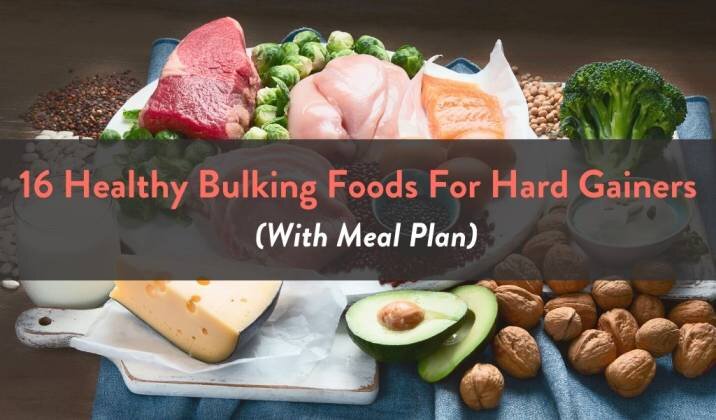
You want to pack on muscle mass. But, you want to focus on quality foods rather than eating everything in sight, which may ultimately be detrimental to your long-term health.
As a nutrition professional who has experienced clients' cholesterol levels increasing due to the unhealthy fat and sugar dumped into the most common calorically dense food, I had to discover the healthiest bulking foods for hard gainers.
Here's is the top 16 healthy bulking foods for hard gainers:
-
Eggs
-
Nuts and seeds
-
Beef
-
Beans
-
Yogurt
-
Milk
-
Cheese
-
Oil
-
Avocado
-
Olives
-
Dried Fruit
-
Whole Grain Bread and Crackers
-
Pasta
-
Potatoes
-
Oats
-
Granola
Whether you want to focus on gaining weight for personal or competition reasons, your fitness goal can be achieved by regularly adding these healthy natural bulking foods to your routine.
Personalizing Your Bulking Nutrition: Everybody is Different
Before we dive into nutrient recommendations and the top healthy bulking foods, it's important to consider that your body, metabolism, and genetic make-up is unique. So there's no diet nor meal plan that works for everybody.
Be realistic about what a reasonable weight gain goal would be for you and your body. Consider where your weight has been as an adult. What do your parents' body types look like? And at what weight do you feel your personal best?
As James Clear explains in his book, Atomic Habits: An Easy & Proven Way to Build Good Habits & Break Bad Ones , true change happens when you commit to the process. That will determine your progress.
When you take drastic measures to shift your weight too quickly, it can result in unhealthy side effects and damage your metabolism, especially if you've struggled with disordered eating in the past, are taking certain medications, or have a medical condition. Make sure to check in with your doctor before making any changes to your diet or fitness plan.
Related Article: What Cardio Should You Do When Bulking? (3 Options)
Metabolism 101
Your metabolism converts the calories (energy) you get from food, into fuel.
Calories support everything you do, from breathing to exercise.
At this very moment, there are thousands of reactions happening in your body to keep your cells healthy and processes functioning optimally.
To gain weight, it's important to first understand a bit about your metabolism and how to estimate your daily calorie burn.
Related Article: Bulking After A Long Cut: 8 Tips For A Successful Bulk
RESTING METABOLIC RATE (RMR)
Your resting metabolic rate is the amount of energy required when your body is at rest. This is the number of calories needed to perform essential life functions such as breathing, circulation, and cell function.
If you're a hard gainer, you'll want to check out my other article on Bulking With A Low Appetite . I give you 13 tips to help you eat more.
THERMIC EFFECT OF FOOD
This is the energy needed to break down the food you eat. Yes it takes energy to eat food! This includes swallowing, digesting, absorbing, and storing food.
THERMIC EFFECT OF PHYSICAL ACTIVITY
This is how much energy you use while performing daily life activities and exercise. This includes energy used to do something as simple as standing all the way to high intensity exercise training (HIIT).
This is important to consider when building a meal plan for gaining weight. If you're moving or training more often, you'll require more high calorie bulking foods.
Related Article: Should Strength Athletes Use The Keto Diet?
NON-EXERCISE ACTIVITY THERMOGENESIS
This is an interesting phenomenon. Think about that person in your life (or maybe it's you) who just can't sit still. They will have a higher non-exercise activity calorie burn. This includes everything from moving around to fidgeting.
Calories for Bulking
There are various equations and formulas for determining your metabolic rate. If you're a hard gainer, the key is to eat above and beyond your standard metabolic rate.
Sports Dietitians Michelle Rockwell, MS, RD, CSSD, and Susan Kundrat, MS, RD, CSSD, created a helpful general guideline with the number of calories athletes should aim for:
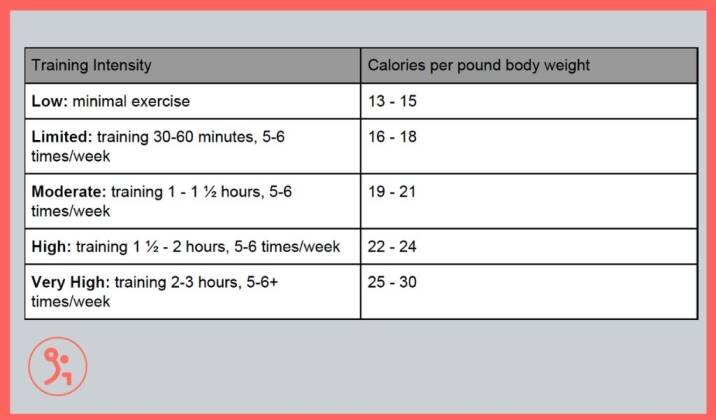
Now, if you're looking to gain weight, you want to add an extra 500-1,000 calories per day.
Here's an example:
A 160 pound athlete training moderately = 3,040-3,360 calories per day.
Plus 500 calories per day for weight gain = 3,540 – 3,860 calories per day.
Another way to determine your calorie needs while bulking is having a surplus of 10% of your standard calorie needs, as recommended by nutritionist, strength training coach and international-level powerlifter, Maggie Morgan.
A realistic rate of weight gain is about 0.5-1 pound (0.25-0.5kg) per week. Keep in mind that any extra will most likely be stored as fat. It's normal to see fluctuations along the way, but the overall progress is what matters most.
Related Article: Can You Eat Anything While Bulking?
Macronutrients for Bulking
Think of calories as the main base of your weight gain journey. Then, you want to focus on the right balance of macronutrients: protein, fat, carbohydrates.
Macronutrients are the nutrients that your body needs in large amounts. As compared to micronutrients (vitamins and minerals) which are needed in smaller amounts.
Related: Check out our article on the 7 Best Breakfast Ideas (With Calorie Breakdown) .
According to Washington State University, each of the macronutrients is responsible for these roles in your body:
-
Carbohydrates: fuel during exercise, spares protein, main energy source for your brain
-
Protein: tissue and muscle structure, involved in metabolism and hormonal systems, influences acid/base balance.
-
Fat: protects vital organs, provides insulation and energy reserve, transports fat soluble vitamins.
When focusing on weight gain, your energy should come primarily from carbohydrate-rich foods. Lean proteins and high quality fats should make up the other half of your diet.
Related Article: Foods to Avoid When Building Muscle
MACRONUTRIENT RATIOS
The Food and Nutrition Board of the Institutes of Medicine (IOM) created macronutrient recommendations based on active individual needs. They calculated that an acceptable macronutrient range is:
-
45%-65% carbohydrate
-
10%-35% protein
-
20%-35% fat
According to fitness expert, Maggie Morgan, she recommends more specific ranges of macronutrient levels when bulking in her Fitbod article, What Should Your Calories & Macros Be When Bulking?:
-
40% carbohydrates (4-7g/kg* body weight)
-
25% protein (2-2.5g/kg* body weight)
-
35% fat (0.5-2g/kg* body weight)
*To convert your weight from pounds to kilograms, simply divide by 2.2.
For instance, 180 pounds divided by 2.2 equals 81.8 kg.
Related Article: The Best Bulking Leg Workouts: 10 Must-Do Exercises
16 Bulking Foods for Hard Gainers
Just because you're trying to gain weight doesn't mean that you should load up on ice cream, cookies, chips, and milkshakes. Of course it's fine to indulge from time to time, but making a habit of it can lead to low energy, physical ailments, and eventually chronic disease.
Instead, pack your day with good quality protein, healthy fats, whole carbohydrates, and fruits and vegetables. Eating well will help give you energy to fuel your workouts and get you feeling your best.
PROTEIN
1. EGGS

Eggs are considered a gold standard when it comes to protein. This is because they contain all of the essential amino acids (protein building blocks).
Eggs are highly bioavailable — digested, absorbed, and utilized efficiently by your body. As quoted in the Essentials of Food Science book, eggs have a biological value of 100%.
Learn more about the incredible eggs and the best ways to cook with them: What Are The Healthiest & Un-healthiest Ways To Eat Eggs?
2. NUTS AND SEEDS
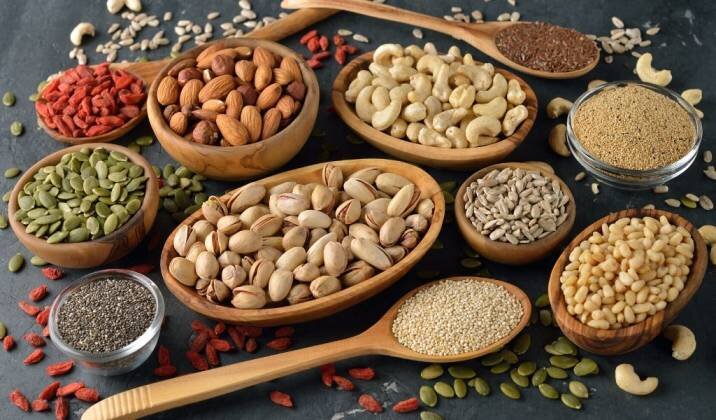
Nuts and seeds are nature's perfect portable snack, especially when you're trying to gain. They contain heart healthy fats, fiber, vitamins, and minerals.
Keep them on hand to prevent an emergency situation when you don't have something to eat. For some extra calories, aim for the versions that have been oiled. Limit the ones with salt, unless you're sweating a lot and need the extra sodium.
Related Article: How To Bulk Up Fast: 10 Tips For Maximizing Muscle Growth
3. BEEF

Beef gets a bad wrap for being fatty and leading to cardiovascular disease. But the trick with beef, is to have it in moderation, and eat the good quality cuts.
Some red meats are high in saturated fat which could increase blood cholesterol. However, new research has been showing conflicting results. To be safe, the American Heart Association recommends reducing saturated fat to no more than 5-6% of total calories, if you have high cholesterol.
Aim for grass-fed versions whenever possible because these contain more heart healthy omega-3 fatty acids. And avoid the processed versions such as highly processed jerky and deli meats.
4. BEANS

Beans, beans are good for your heart; and also for hard gainers. They're packed with nutrients such as iron, potassium, zinc, and folate. They're also rich in plant-based protein and fiber.
If you're new to beans, incorporate them slowly and drink plenty of water. This is because it can take your tummy some time to adjust to more fiber.
Depending on the type of bean, one cup contains about 200-300 calories. To make them even easier to eat, mash or blend them up. Try this delicious Spicy Black Bean Soup recipe from Cookie and Kate.
5. YOGURT

Yogurt not only provides your gut with a boost of healthy bacteria, it's also rich in good quality protein for muscles.
The variety of choices out there can be confusing. But if you're looking to gain weight, go for the full-fat versions. Avoid the ones with lower fat contents (unless you have high cholesterol or heart health concerns) because these often contain added sugars to replace the fat.
Yogurt makes for an excellent snack with some fruit and nuts. It's also a perfect base for a home-made smoothie or shake.
6. MILK

Milk is an excellent combination of fat, carbs, and proteins. It also contains lots of vitamins and minerals, including bone strengthening Vitamin D and calcium.
The protein in milk is 20% whey and 80% casein. It also contains branched chain amino acids which can boost exercise performance. Studies show they are best absorbed in their natural state, such as in milk versus a powder or supplement.
Since milk is easy to absorb, it makes for a perfect post-workout fuel.
Is Milk Bad For Bodybuilding? (5 Things To Consider)
7. CHEESE

Cheese is an outstanding source of fat, protein, calcium, and calories. When you're looking to gain weight, aim for the full-fat versions.
Studies show that cheese doesn't necessarily increase the risk for cardiovascular disease, however, in general, replacing dairy fat with polyunsaturated fat (found in plant-based foods) can help boost heart benefits.
Keep in mind that not all cheese is created equal and one serving is about the size of two dice so it goes quickly. Aim for the hard cheeses like cheddar and ricotta. Check the ingredient list and aim for the cheeses that are more natural.
FATS/OILS
8. OIL

Plant-based oils such as the ones from olives and avocados provide lots of calories and heart-healthy unsaturated fats. One tablespoon contains about 120 calories!
Use caution when cooking with oils since some can get damaged when cooked at high heats. Check out BonAppetit's guide: The Best Oils for Cooking, and Which to Avoid.
Add oil to your cooking, drizzle it on salad, and even consider adding a bit to smoothies for an easy source of extra calories.
9. AVOCADO

Avocados are an amazing source of heart-healthy fats and vitamins such as powerful antioxidants, vitamin E. These can help your cholesterol levels — lowering the "bad" low-density lipoproteins (LDL) while increasing the "good" high-density lipoproteins (HDL).
Avocados also packed with calories, at about 300 per avocado.
Add avocados to your smoothies for a plant-based way to make them creamy. Slice them over salads or serve up some avocado toast. You can even eat them on their own with a bit of salt, as functional medicine expert, Dr. Hyman loves to snack on.
10. OLIVES
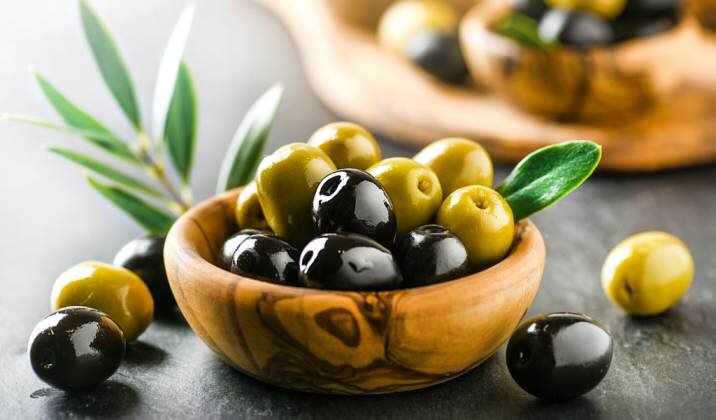
Olives are high in healthy fats and vitamin E, and oleic acid, all helpful for heart health and decreasing inflammation.
Black olives are naturally rich in antioxidants.
Olives are great additions to salads, omelettes, sandwiches, and tapenades.
CARBS
11. DRIED FRUIT
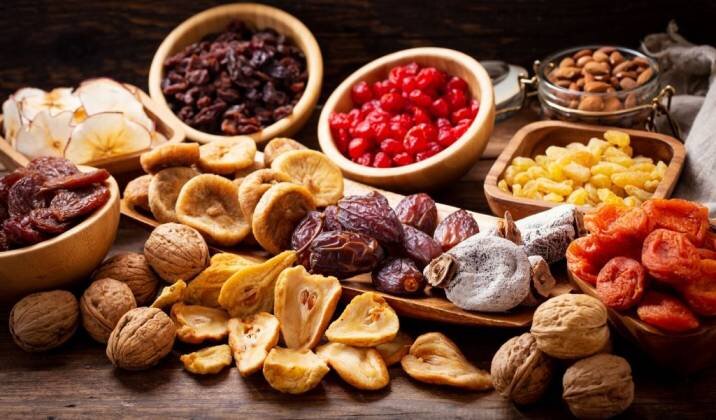
Dried fruit is high in calories and natural carbs. It also contains antioxidants and nutrients. Due to their high natural sugar content, they're great for gaining weight. They're convenient, easy to eat, and can actually increase hunger for some people.
Keep an easy snack of dried fruit and nuts on hand or get creative with your dried fruit and add it to your main dishes. Add some dates or raisins to a grain like couscous to make a Mediteranean style dish.
Check the labels and avoid the types with preservatives and added sugar.
12. WHOLE GRAIN BREAD AND CRACKERS

When you choose the whole grain versions of bread or crackers, you'll be getting complex carbohydrates, which provide steady energy, fiber, and vitamins and minerals.
Check the ingredient list to make sure they contain whole grain ingredients. As a rule of thumb, look for at least 3grams of fiber per serving.
Whole grain breads and crackers are perfectly paired with protein sources. For instance, have bread and eggs for breakfast, crackers and hummus for a snack, or a peanut butter sandwich on the go.
13. PASTA
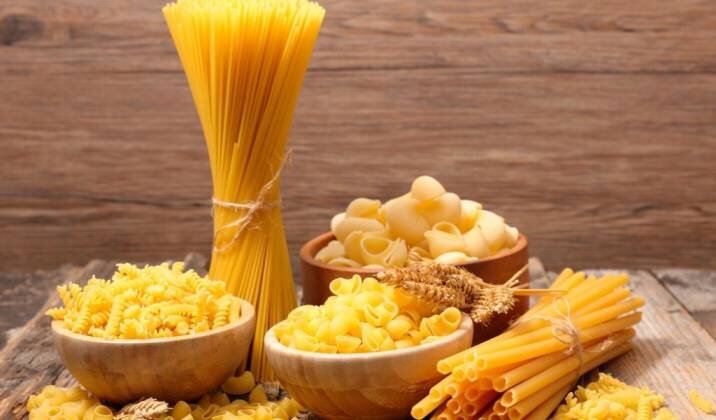
Sometimes known as a pre-competitive carb loader's dream meal, this moderately high calorie food has about 200 calories per cup. Pasta is also rich in B vitamins which help cell and metabolic energy.
Pasta can be adapted to many hard gainer friendly dishes. Eat it as a main meal with pasta sauce or cook then refrigerate it to make a pasta salad. To up the calories, add oils, sauces, and even foods like avocado.
Check out this delicious vegan 15-Minute Creamy Avocado Pasta from Oh She Glows.
14. POTATOES

These non-perishable root vegetables are rich in carbohydrates that can be used as quick energy, or stored as muscle or extra weight. They are also rich in potassium which can be helpful for blood pressure and hydration during tough workouts.
Choose the natural sources of potatoes instead of french fries and potato chips which contain lots of salt and unhealthy fats. These tend to contain trans fat which is even linked with some cancers and heart disease.
A simple and inexpensive meal can be a baked potato with your favorite toppings!
15. OATS

Although these are typically thought of as a diet food, oats can also help with weight gain. They're a rich source of soluble fiber which can help stabilize blood sugar for lasting energy and keep things moving through your digestive tract.
Try making your morning oats with milk for extra calories and creaminess. Top with nuts, dried fruit, and honey; your choice.
Oats are also excellent for making healthy versions of cookies. They can also be added to scrambled eggs for some extra umph — it may sound strange, but don't knock it until you try it. Simply add a small handful to the pan and mix in.
16. GRANOLA

Granola is typically made from oats then coated with oil and sweeteners such as honey and brown sugar. It's usually mixed with some chopped nuts and dried fruit giving it upwards of 500 calories per cup.
Top your yogurt with some granola or eat it as cereal with milk and you'll be getting even more hard gaining calories.
Since store bought granolas can contain lots of refined sugars, try roasting your own at home. Check out Alton Brown's recipe, from the Food Network.
FRUITS AND VEGETABLES
You may be asking why fruits and vegetables didn't make the health bulking foods for hard gainers list. Fruits and vegetables are nutrient dense (meaning they contain a lot of vitamins and minerals) but are low in calories.
With that said, they are not to be neglected! As Harvard explains, a diet rich in fruits and vegetables can lower blood pressure, reduce the risk of heart disease, prevent some types of cancer, lower the risk of digestive problems, and regulate blood sugar.
Try adding fruits and vegetables to your meals and aim to include a variety. If you find that these are filling, try sneaking them into smoothies or focus on the ones that cook down. For instance, try adding cooked mushrooms and spinach to your pasta or eggs.
How To Incorporate Weight Gaining Foods
Now that you know which foods lend a helping hand in helping you hard gain, let's chat about sneaky tips and tricks for how to incorporate them into your daily routine.
EMERGENCY SNACKS: ON HAND AT ALL TIMES
These natural foods have a high caloric density, meaning there's a lot of calories and nutrition in small amounts. They're also non-perishable so perfect to keep with you in your gym bag or car. They'll be there for you if forget a snack or aren't able to access food.
-
Nuts
-
Seeds
-
Dried fruits
AT HOME MUNCHIES
These may be a dieter's temptations, but when you're trying to pack on the muscle, they assist your weight gain efforts.
You can also occasionally eat when you're distracted (such as watching TV). This is the opposite of mindful eating practices, but when your goal is to gain, sometimes it can help to eat before your brain registers that you're full.
The trick is to eat small amounts, often.
-
Cheese
-
Olives
-
Crackers or bread
-
Peanut or nut butter
-
Hummus
-
Home-made popcorn
FOCUS ON FATS
Fat contains the most significant amount of calories per gram (9kcal per gram versus 4kcal per gram for protein and carbs). This makes it a star when it comes to being a bulking food.
As a bonus, eating high-carb, high-fat foods, have been proven to increase appetite and cravings. This will encourage you to eat more. According to Harvard School of Public Health, they can aid in weight gain.
-
Nuts and dried fruit
-
Guacamole and tortilla chips
-
Grain crackers with peanut butter
-
Hummus with pita
DRINK YOUR CALORIES
Store-bought shakes don't do you body good because they tend to contain lots of processed and unhealthy ingredients. But if you consume your calories in the form of home-made smoothies, protein shakes, or even milk, you'll get more calories without the fullness.
Make the smoothies with the things you love. You want to enjoy bulking, not loath it. It's super simple: start with a base such as milk (vegan alternatives are fine here), then add frozen fruit for texture, add some nut butter, yogurt, or avocado, blend and enjoy.
Also consider investing in a good easy to clean and maintenance smoothie blender. Here's a solid buying guide for your convenience
Example Meal Plan for Hard Gainers
Everybody is different and requires varied amounts of calories. Combine the recommended calorie and macro guidelines discussed above, with this meal plan guide.
Feel free to be flexible with it. You can swap foods of the same macro category (protein for protein for instance). Aim to eat about five to six times per day. Meal times can be adjusted to fit your schedule. The key is to keep eating!
| MEAL | FOOD |
|---|---|
| Breakfast | 1 cup instant oats (dry) – 300 kcal 2 Tbsp peanut butter – 175 kcal 1 banana – 100 kcal 1 cup milk – 150 kcal 725 kcal |
| Snack | 1 cup low-fat yogurt – 100 kcal ¼ cup raisins – 100 kcal 2 ounces granola – 275 kcal 475 kcal |
| Lunch | 2 slices whole grain bread – 200 kcal 3 ounces chicken breast – 150 kcal ½ avocado 150 kcal Lettuce (negligible calories) 1 cup apple sauce – 100 kcal 600 kcal |
| Snack | 2 hard boiled eggs – 150 kcal 2 ounces cheese – 200 kcal 12 grain crackers 150 kcal 500 kcal |
| Dinner | 4 ounces salmon – 225 kcal 2 cups brown rice – 300 kcal 2 tbsp oil – 250 kcal 1 cup mixed veges (negligible calories) 1 cup black beans – 125 kcal 900 kcal |
| Snack | 1 ounce chocolate – 150 kcal 1 ounce home-made popcorn – 150 kcal 300 kcal |
| TOTAL CALORIES: | 3500 kcal* |
Final Thoughts
Just like any sustainable change, weight gain takes time. It won't happen overnight. Try not to get discouraged if you don't see results right away.
Remember that any behavior change involves developing new habits, and old habits are hard to break. But if you keep chugging (and chewing) along, you'll get to your goal.
For advice on exercises that build muscle on your journey toward hard gaining, check out our trusted fitness programs. We got you!
About The Author

Lisa Booth
Lisa is a registered dietitian nutritionist (RDN) with over 15 years of experience in nutrition, fitness, and mental health coaching and education. She studied Foods and Nutrition at San Diego State University and earned a Master of Science in Holistic Nutrition at Hawthorn University .
Having certifications and experience in group exercise, intuitive eating, coaching and psychotherapy, and digestive wellness, she's enthusiastic about the relationship between the body and mind.
She's dedicated to helping people understand how to implement healthy habit change, while gaining a deeper understanding of what makes them feel their personal best.
Diet Plan for Bulking Up Muscle
Source: https://fitbod.me/blog/healthy-bulking-foods/